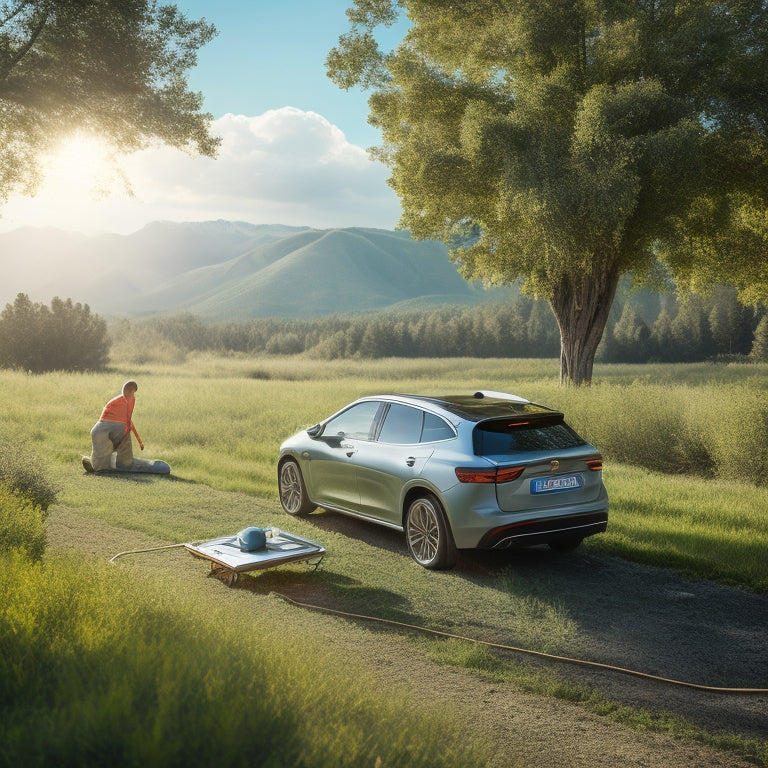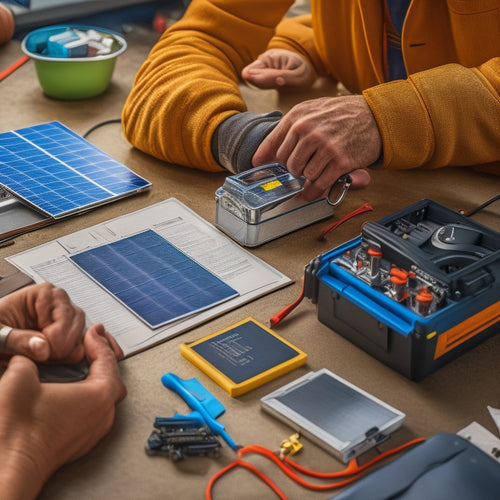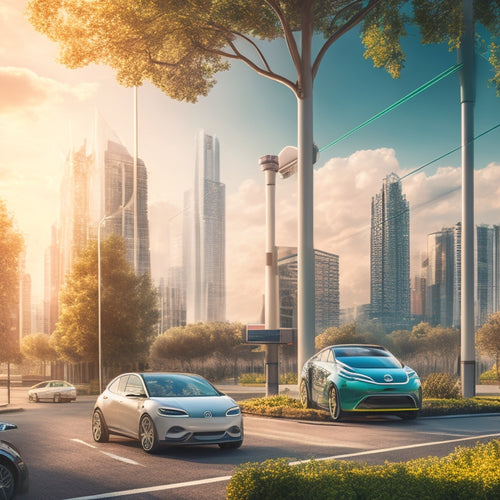
7 Essential Tips for Portable Solar Car Power
Share
When selecting a portable solar car power system, you'll need to balance efficiency, durability, and safety considerations. First, choose solar panels with high efficiency ratings and durable construction. Assess your power needs by conducting an energy audit and selecting a charger that meets your requirements. Confirm your system is weather-resistant and protected from overheating. Regularly inspect and maintain your batteries, and take safety precautions such as grounding and protective gear. By following these essential tips, you'll be well on your way to a reliable energy solution. As you consider these key factors, you'll unleash the full potential of your portable solar car power system.
Key Takeaways
• Select high-efficiency solar panels with a rating above 20% for maximum energy harnessing and a durable design.
• Assess power needs and select a charger that matches the wattage and voltage of devices, balancing capacity with travel restrictions.
• Ensure durable and weather-resistant solar panels with waterproof coatings, UV protection, and sealed joints to withstand harsh conditions.
• Prioritize electrical safety by following proper grounding, avoiding overloading, and storing batteries properly to prevent overheating and damage.
• Implement overheating prevention measures, including thermal shielding, ventilation systems, and heat-resistant components to ensure safe operation.
Choosing the Right Solar Panels
What type of solar panels will provide the necessary power and efficiency for your car's electrical system, considering factors such as panel size, efficiency, and durability?
When choosing the right solar panels for your car, you'll want to take into account a few key factors. First, think about the size of the panel. A larger panel will provide more power, but it may not be as portable. You'll need to strike a balance between power output and convenience.
Next, consider the efficiency of the panel. A more efficient panel will provide more power per hour of sunlight. Look for panels with high-efficiency ratings, usually above 20%.
Durability is also important, as you'll be transporting the panel in your car. Look for panels with a sturdy frame and waterproof coatings.
Assessing Your Power Needs
As you've selected the right solar panels for your car, now it's time to determine how much power you'll need to keep your electrical system running smoothly. Evaluating your power needs is vital to make sure you're generating enough energy to support your appliances and gadgets on the go.
To do this, you'll need to conduct an energy audit, which involves identifying the devices you'll be powering and their respective energy requirements. This will give you a clear picture of your overall power needs.
Next, create a power profile, which outlines the total energy required to run your devices simultaneously. Consider the wattage, voltage, and ampere requirements of each device, as well as the duration of use. This information will help you determine the minimum power output required from your solar panels to keep your system running efficiently.
Selecting Portable Charger Size
Based on your power profile, you can now determine the minimum portable charger size required to meet your energy needs, taking into account the total wattage and voltage of your devices. This will guarantee you have a reliable power source on the go, without overloading your charger.
When selecting a portable charger, consider the charger capacity, measured in watt-hours (Wh). A higher capacity charger can charge your devices more times, but may be heavier and bulkier. Consider your travel restrictions and the space you have available.
Here's a rough estimate of charger capacity requirements:
| Device Type | Minimum Charger Capacity (Wh) |
|---|---|
| Smartphone | 10,000 - 20,000 |
| Laptop | 40,000 - 60,000 |
| Camera | 5,000 - 10,000 |
Understanding Efficiency Ratings
You'll want to examine the efficiency rating of your portable solar car power system, which is typically expressed as a percentage, to make sure you're getting the most out of your charger. This rating indicates how well the solar cell converts sunlight into usable energy. A higher efficiency rating means more power is generated from the same amount of sunlight, making your charging process faster and more efficient.
When evaluating efficiency ratings, look for systems with high conversion rates. A good portable solar car power system should have an efficiency rating of at least 15%. This means that 15% of the sun's energy is converted into usable electricity. Anything lower, and you might be wasting valuable charging time.
Energy conversion is a critical aspect of portable solar car power. A high-efficiency system ensures that you're harnessing the maximum amount of energy from the sun, reducing your reliance on traditional power sources.
Durability and Weather Resistance
Your portable solar car power system's durability and weather resistance play a critical role in withstanding harsh outdoor conditions, ensuring your charger continues to function at its best even in extreme temperatures, heavy rainfall, or intense sunlight. When selecting a portable solar car power system, look for features that guarantee durability and weather resistance.
| Feature | Description | Benefits |
|---|---|---|
| Waterproof Coatings | Protects against water and moisture | Maintains continuous function in rainy or humid conditions |
| UV Protection | Shields against harmful UV rays | Prevents damage to internal components |
| Durable Housing | Rugged and robust design | Withstands rough handling and extreme temperatures |
| Sealed Joints | Prevents water and air infiltration | Ensures reliable performance in harsh environments |
| Weather-Resistant Connectors | Protects against corrosion and water damage | Guarantees secure connections in any weather |
Maintenance and Storage Tips
To get the most out of your portable solar car power system, you'll want to follow some essential maintenance and storage tips. By doing so, you'll guarantee your system remains efficient and reliable over time.
Clean and Inspect Regularly
Regular cleaning and inspection of your portable solar car power system's components, such as panels, cables, and connectors, helps prevent damage from dirt, dust, and corrosion. When you neglect to clean your system, dust accumulation can reduce panel reflection, decreasing energy output. You'll be surprised at how much energy you can lose due to a thin layer of dust.
You should inspect your system regularly to identify any signs of wear and tear. Check for loose connections, frayed cables, and corrosion on metal components.
Clean the panels gently with a soft cloth and mild soap solution to remove dirt and debris. Avoid using harsh chemicals or abrasive materials that can scratch the panels.
Store in Cool Dry Place
When not in use, stow your portable solar car power system in a cool, dry place to protect it from extreme temperatures, moisture, and physical damage. Proper storage is essential to maintain the system's performance and extend its lifespan.
To guarantee ideal storage, consider the following climate control and storage solutions:
-
Avoid attics, garages, or outdoor sheds that are prone to extreme temperatures, humidity, or direct sunlight.
-
Opt for a climate-controlled environment, such as a basement or a room with a consistent temperature between 60°F to 75°F (15°C to 24°C).
-
Use a protective cover or storage bag to shield your system from dust, moisture, and physical damage.
-
Store your system in a dry, well-ventilated area to prevent moisture buildup and corrosion.
-
Keep your system away from direct sunlight to prevent overheating and damage to the solar panels.
Protect From Physical Damage
Handle your portable solar car power system with care to prevent scratches, dents, and broken components that can compromise its performance and lifespan. A little attention to physical protection can go a long way in maintaining the system's efficiency.
When selecting a case for your portable solar car power system, consider the following factors:
| Case Selection Criteria | Description | Importance |
|---|---|---|
| Durability | Resistance to scratches and dents | High |
| Water Resistance | Protection against rain or water spills | Medium |
| Portability | Lightweight and compact design | High |
| Material | Durable and weather-resistant materials | Medium |
| Brand Reputation | Trustworthy brand with quality products | Low |
Choose a case that fits your system snugly, and make sure it's made from durable materials that can withstand the elements. Additionally, consider strap materials that are sturdy and resistant to wear and tear. By taking these precautions, you'll be able to enjoy uninterrupted power on-the-go while protecting your investment.
Safety Precautions and Preventions
When working with portable solar car power systems, it's crucial to prioritize safety to avoid accidents and guarantee reliable performance.
You'll need to take precautions to prevent electrical shocks, handle batteries safely, and prevent overheating.
Electrical Shock Prevention
To prevent electrical shock when working with your portable solar car power system, make sure you follow proper safety protocols to minimize the risk of electrical shock. As you set up and maintain your system, it's important to take precautions to avoid electrical shock, which can be deadly.
Here are some essential safety tips to keep in mind:
-
Confirm your system is properly grounded to prevent electrical shock. A well-designed grounding system is vital to your safety.
-
Regularly inspect your electrical connections and cables for signs of wear and damage. Frayed cords or corroded connectors can be a shock hazard.
-
Perform regular electrical inspections to identify potential issues before they become safety hazards.
-
Avoid overloading your system, as this can cause electrical components to fail and increase the risk of shock.
-
Keep your workspace clean and dry to prevent electrical shock. Moisture and clutter can increase the risk of electrical shock.
Battery Handling Safety
When working with portable solar car power systems, you'll inevitably encounter batteries, which demand special care to prevent accidents and guarantee safe operation. As you handle batteries, remember that safety should always be your top priority.
Battery Safety Guidelines
| Safety Precaution | Description |
|---|---|
| Wear protective gear | Gloves, safety glasses, and a face mask can protect you from acid spills and electrical shock. |
| Avoid overcharging | Unplug batteries when fully charged to prevent overheating and damage. |
| Store batteries properly | Keep them in a well-ventilated area, away from flammable materials and out of children's reach. |
| Inspect batteries regularly | Check for signs of wear, corrosion, or damage, and replace faulty batteries promptly. |
| Recycle old batteries | Participate in battery recycling programs to minimize environmental impact and promote sustainability. |
Overheating Prevention
You must take proactive measures to prevent overheating, which can lead to catastrophic battery failure, electrical fires, or even explosions. When it comes to portable solar car power, temperature control is essential to guarantee the longevity and safety of your system.
To prevent overheating, consider the following essential tips:
-
Thermal shielding: Use thermal shielding materials to insulate your battery and electrical components from direct sunlight and heat sources.
-
Ventilation systems: Install ventilation systems to circulate air and dissipate heat around your solar panels and electrical components.
-
Shade provision: Provide shade for your solar panels and electrical components to reduce direct sunlight exposure.
-
Heat-resistant components: Use heat-resistant components and wiring to minimize the risk of overheating.
-
Monitoring systems: Install monitoring systems to track temperature fluctuations and alert you to potential overheating issues.
Frequently Asked Questions
Can I Use a Portable Solar Panel to Charge a Lithium-Ion Battery?
As you initiate on this eco-friendly journey, remember that a portable solar panel can be a powerful ally, but don't take it for granted - use a charge controller to regulate voltage and prioritize battery safety when charging your lithium-ion battery.
How Long Does It Take to Fully Charge a Portable Solar Charger?
You'll find that the charge time for your portable solar charger depends on factors like solar panel efficiency, battery capacity, and the amount of sunlight it receives, making it hard to pinpoint an exact time.
Can I Connect Multiple Solar Panels to Increase Power Output?
"Ah, you think you're a solar genius, huh? Connecting multiple panels, eh? Well, you're on the right track! You can link them in parallel for added amps or series for boosted volts - just don't get them mixed up, or you'll be in for a shock!"
Will a Portable Solar Panel Work During Cloudy or Rainy Days?
You'll find that portable solar panels still generate some power on cloudy days, although their Cloudy Performance is reduced; in Rainy Conditions, expect minimal energy output, but don't worry, it's not a total loss, just a reduced one.
Are Portable Solar Panels Suitable for Charging Electric Vehicles?
As you consider charging your EV, note that 80% of US drivers daily commute is under 40 miles, making portable solar a viable option. You'll be part of the renewable future, supporting EV infrastructure growth, but it's important to choose a high-efficiency panel for reliable charging.
Related Posts
-

7 Essential Tips for DIY Solar Car Battery Install
To guarantee a successful DIY solar car battery installation, you'll need to choose the right components and follow p...
-

Why Eco-Friendly Rides Are the Future of Commuting
As you seek alternatives to traditional vehicles, you'll find eco-friendly rides are not only convenient and cost-eff...
-

Designing Efficient Vehicle Charging Infrastructure Systems
As you design efficient vehicle charging infrastructure systems, prioritize strategic planning and optimization to av...


